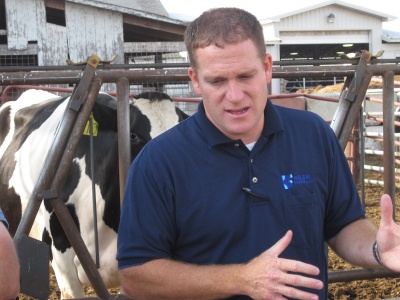
Joe Kelsay talks about dairy feeding practices with Canadian media on Dow AgroSciences' tour.
Corn yields are turning out to be slightly lower than expected in parts of the U.S. Midwest.
"Generally, the expectation was pretty good, certainly in August with the crop report from the USDA. They've since softened those numbers a little bit," says Joe Kelsay, a dairy and corn producer who farms just south of Indianapolis, Indiana. "As far as our own production, we started harvest on Monday. Variability is the name of the game. I fear we'll end up with average yields on our operation."
He notes the early-harvested corn yields are ranging from 150 to 225 bushels per acre. Corn accounts for around 1200 of the 2200 acres managed by Kelsay Farms . Another 600 acres are devoted to soybeans while another 400 acres are mainly in alfalfa. Most of the land is tiled drained. Kelsay says they are also trying different methods to prevent soil erosion. That includes planting a combination of barley and radish after soybean harvest. He says the radishes create ideal root pathways for crops the following year. The radishes are killed by the frost while the barley is sometimes harvested in spring.
The main focus of Kelsay Farms is the 470 cow dairy operation. Kelsay notes the American dairy industry has turned around since prices hit record lows in 2009. "I think we've turned a corner, but at the same time, feed prices are gaining steam once again. I certainly believe it's good to have high grain prices and high livestock prices, but when there's disparity there, there's sometimes some growing pains between those two sectors."
American dairy production differs greatly from Canadian dairy production when it comes to marketing. Unlike the supply managed system in Canada, producers like Kelsay are responsible for finding their own market and negotiating their own prices. He says their milk is delivered directly to Dean Foods in Kentucky. Prices are set on a monthly basis. Current prices are close to break-even levels at between $18 and $18.50 per hundred weight, a significant increase from lows around $12 per hundred weight in 2009.
Kelsay Farms was one of the stops on the Dow AgroSciences Canada Innovation in Agriculture tour earlier this week. The six-generation farm has been under the Kelsay name since 1837.
~ Friday, September 24, 2010 ~



